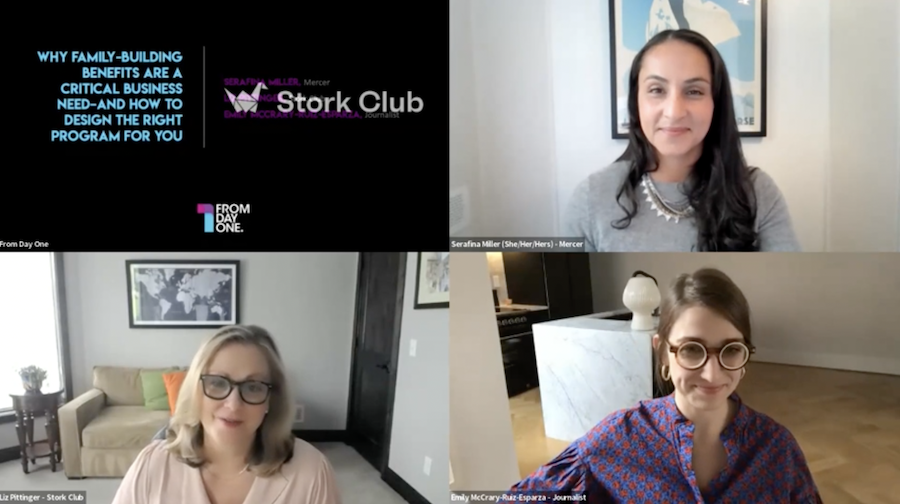How Employers Are Making Family-Building Benefits More Inclusive


Now that employers are more cognizant of the myriad ways families look and operate, and of many ways one might add children to a family, they’re removing barriers to access reproductive health care benefits and providing multiple pathways to family-building. An example of one such barrier: “Historically speaking, women would require a diagnosis of infertility to receive access to artificial insemination in vitro fertilization, if it was covered,” said Serafina Miller, senior principal consultant with the health practice at Mercer, the employee-benefits consultancy.
The relationship in such situations, however, are changing. “It becomes more of a partnership between the employee or their covered dependent and the endocrinologist or the attending physician and the specialists,” Miller said.
In a webinar titled “Why Family-Building Benefits Are a Critical Business Need–And How to Design the Right Program for You,” Miller spoke with Liz Pittinger, head of global customer success at family-health benefits provider Stork Club. The two talked about the most popular and innovative additions to health care packages that support the needs of diverse workforces.
“It’s good business to have more inclusive environments,” said Pittinger. As employers work harder to make benefits packages that attract and retain talent, reproductive health benefits are getting a special focus.
Companies expanding their slate of benefits for the first time generally start by adding coverage for in vitro fertilization, or IVF, said Miller, sharing the results of a 2022 Mercer survey. For several decades, about 20% of companies with more than 500 employees covered IVF, but in the last few years, that share has increased. As of 2022, 43% of large employers offer IVF, according to Mercer’s results.
Further, Miller noted a change in the way employers contribute financially. Where they once designated dollar limits on services like IVF, companies are now moving to cycle-based coverage, in which employees are covered at 100% for a specific number of in vitro cycles. The goal is to make it possible for more people to use the benefit without worrying about the cost.
In addition to family-building benefits, packages now feature broader reproductive-care measures, like menopause care that includes referrals to endocrinologists and OB-GYN practitioners who specialize in its effects. “Companies that have senior women in senior leadership are more profitable than those that don’t,” said Pittinger. “But if they’re leaving because they can’t manage the symptoms of menopause, then do you really have an inclusive environment or an inclusive benefits program?”

Men’s reproductive health concerns are getting more attention too. They’re becoming “more active participants” in their own reproductive care, Miller noted. Not only are men exploring options like sperm freezing, they’re also interested in long-term hormonal health and showing up more in the family-building process. Pittinger’s company gets behind this too: Whenever a covered employee joins Stork Club, they’re encouraged to invite their partner.
Start-to-finish reproductive benefits packages include mental health care that works in tandem with the family-building process. “Especially if they’re undergoing a fertility or family journey, whether it’s adoption or surrogacy, it creates added stress,” said Miller.
Inclusive care must also consider location, which can be a problem for those outside of major metropolitan areas. “As more employers move to hybrid or even remote-first work, there’s a recognition that there’s a greater need for more access,” Miller said. “Most fertility providers are going to be huddled in major cities if we’re thinking about [intrauterine insemination] and IVF treatment.” To make such care available to all, employers are adding travel and lodging stipends.
Perhaps one of the most important elements of inclusive family-building benefits is culturally competent care, said Miller. That is, access to providers who are understanding of the needs of marginalized groups, perhaps even belonging to those groups as well. “Whether it’s supporting someone who’s in the LGBTQIA+ community, or who’s a Black woman or a Latina woman, where the providers align with the patient base they’re supporting, where there’s aligned experiences, we know that that improves health outcomes.”
Editor’s note: From Day One thanks our partner, Stork Club, who sponsored this webinar.
Emily McCrary-Ruiz-Esparza is a freelance journalist and From Day One contributing editor who writes about work, the job market, and women’s experiences in the workplace. Her work has appeared in The Washington Post, Quartz at Work, Fast Company, Digiday’s Worklife, and Food Technology, among others.
The From Day One Newsletter is a monthly roundup of articles, features, and editorials on innovative ways for companies to forge stronger relationships with their employees, customers, and communities.